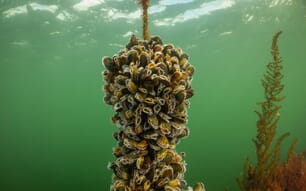Called Target 75, it is the brainchild of the Sustainable Fisheries Partnership (SFP), and was unveiled just prior to the beginning of the SeaWeb Seafood Summit in Seattle. The initiative is so named because the ultimate goal is to see 75 percent of the world’s seafood produced in a sustainable manner, or demonstrating improvement toward sustainability, by 2020. To get there, SFP is calling on the seafood industry at large to consider industry-based improvement projects and similar pre-competitive collaborations, something SFP has been helping its partners to do for years.
“This is a method that we’ve used for more than 10 years now,” said Jim Cannon, SFP’s Founder and CEO. “We know it works, and significant industry stakeholders know it works. Now, we hope to see the method adopted in sectors where we know there’s little data to assess sustainability, or no progress toward sustainable seafood production. With the industry’s help, I’m confident we’ll get there.”
Many of SFP’s partners can attest to the value of the industry-driven approach.
“Sobeys’ partnership with SFP has shown us that it’s possible for the industry to take the lead on responsible seafood sourcing,” said Scott Tudor, Sustainability Director for Sobeys. “Our 110-year history began in Atlantic Canada and we have long-standing relationships with sustainability-focused seafood companies there, as well as across Canada and around the globe. Sobeys is proud to say we’re doing our part to contribute to the Target 75 goal, and we encourage other stakeholders to join the initiative.”
"Seachill is fully committed to globally responsible sourcing as part of our Quality Naturally CSR program, and our partnership with SFP is at its core helping to drive the pace and measure the progress of industry collaboration to develop sustainable fisheries and aquaculture,” said Nigel Edwards, Technical and CSR Director for Icelandic Seachill. “We are in our 20th year of continuous engagement in sustainability and hope that this Target 75 initiative will inspire other companies to set similar goals."
SFP is making the announcement at the summit to garner support from the NGO community as well. While methods no doubt vary from one organization to another, SFP believes the core purpose — seeking a successful and environmentally friendly future for the industry — remains the same.

